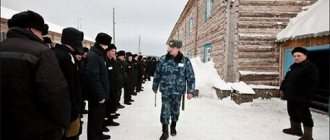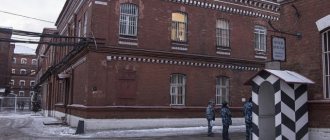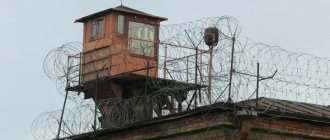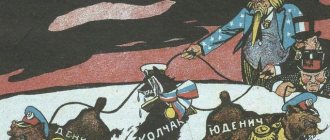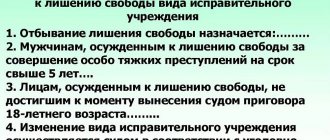Prison is a place where life follows different rules than in freedom. Places of detention are designed to correct a person who has committed acts dangerous to society, so these rules are very strict. But is this true in all prisons in the Russian Federation? Answer: no.
There are so-called “red zones” and “black zones”. This article defines what the former mean, why prisons are called that, and describes their features and differences from the latter.
What it is?
A “red” prison is one in which the law rules. There is not the slightest deviation from state documents. Everything is as per the instructions. It often happens that in the “red” zones, prisoners cooperate with prison employees.
In such detention centers, the law is executed with meticulousness, which sometimes becomes more difficult for the prisoners than the punishment itself, because... for the slightest disobedience they will face very serious punishment from the jailers and other representatives of the prison authorities. The administration of the correctional institution does not see the limits of its power, so punishments often include isolation in solitary confinement, deprivation of any rights (they may be deprived of a walk, lunch, etc.), and sometimes beatings.
Who is "the man"?
“Men” are perhaps the largest and most neutral group of prisoners. It includes prisoners who received sentences for committing minor crimes. As a rule, these are completely random people in prison: having entered the zone once, they try to get free as quickly as possible and return to normal life in the wild.
Among the “men” there are, of course, prisoners whom the “thieves” respect and even listen to their opinions.
This group of prisoners is considered neutral and quite large. And if we talk about who a “man” is, this is the prisoner who, at the end of his sentence, will forget everything like a “bad dream” and will try not to return to the zone again.
How is it different from “black”?
The main difference between the “Red” zone and the “black” zone is the fact of obedience to the laws of the Russian Federation. The “blacks” are ruled by the “thieves’ law”, which has its own rules of behavior, characteristics and traditions.
The prison administration establishes contacts with one of the authoritative representatives of the “prison suit” and cooperates with him in resolving many issues. Often, prisoners themselves choose the person who will be held accountable to them for the actions of the administration.
The second difference lies in the living conditions in prisons. As a rule, it is easier for prisoners to survive in “black” colonies, despite the fact that funding for such colonies is extremely limited. The rules of this type of prison allow prisoners very, very much. In the “red” zones, the administration makes sure that the prison has everything necessary: clothing, food, personal hygiene products, bed linen, towels, etc. That is. The standard of living in “red” zones is many times higher, but in general it is more difficult to live in such a PS.
Another difference is the attitude towards cooperation with the prison administration . Residents of the “black” zones do not accept (or even punish) those who make at least some kind of deal with the jailers, if they are not agreed upon with the “men,” while in the “red” prisoners simply have no choice: if the prison officer He said that you have to work for him, then you have to, otherwise severe punishment is guaranteed.
The main thing that distinguishes these types of prisons is order. In the “red” zones, there are no strikes, fights in cells, crimes, theft and violence, since these actions are punishable by law, and, accordingly, the prison administration will not turn a blind eye to this and impose punishment.
On the “blacks” this happens due to the fact that a large share of power is in the hands of the prisoners themselves, but they are also stopped by the forces of authoritative prisoners.
Words from one of the prisoners serving his sentence in the “red” zone:
“You can’t get drugs or alcohol here at all.” This is the first time I have seen such a zone. Previously, no matter where you sat, there were people who were able to get whatever their heart desired. And here... And, you know, this is good. At first it’s very difficult for many, but how many people here have “broken” and been saved from alcoholism and drug addiction. And this is very important. It saves.
I was in a zone that was considered “red”. But there the employees almost openly sold drugs. And many convicts began using in prison! Now I'm on my third trip. And the third zone. So, I think everything should be according to the law, and a prison should be a prison. Like here. Yes, it is difficult without many things, but who is to blame for this? It's your own fault. If you mess up, answer. The punishment must be strict, otherwise it is no longer a punishment, but an all-inclusive resort.
Be that as it may, according to the chairman of the Union of Prisoners of Russia Natalia Chernova, not everything is so rosy in the “red” zones. There is funding, but it goes far beyond what the prisoners need, because... the overall picture of the colonies is terrible. In her interview for Deutsche Welle, Natalia says:
“I have nothing against the very letter of the law, but the fact is that the Federal Penitentiary Service wants prisoners to fulfill exactly all their duties, despite the fact that the FSIN itself does not fulfill its duties in relation to prisoners. That is, yes, you can walk in formation, join different sections, do all this Sisyphean work that prisoners do in the zones.
But it’s impossible to do all this and live like this if you live in a cold, unheated barracks with a leaking roof that hasn’t been repaired for thirty years. And at the same time you are fed naked chicken for breakfast, lunch and dinner. If they don’t allow you to hand over, if they take away all your free clothes, and the government clothes that they give you, it’s really pitiful and scary to look at.” In the “black” zones, she said, the prison administration turns a blind eye to some things in order to allow prisoners to survive.
Video review of the differences between a black prison and a red one:
Foremost
The leader of the "thieves" is the "godfather" - a recognized criminal authority. If there is no such person in the zone, then a “supervisor” is appointed - a prisoner who performs the functions of a leader.
The “godfather” and his associates (that is, the “thieves”) have special privileges in the zone. They may not work and keep whatever they deem necessary from the common fund.
In the modern world, many “thieves” in the zone interact with the administration and establish those orders that are beneficial to the leadership of the colony. In return, the “thieves” are given comfortable living conditions (they secretly receive alcohol, marijuana, telephones and other benefits). Although this does not correspond to thieves’ concepts, market relations now reign in the zone.
Where is better?
According to many prisoners, it is much more difficult in the red zones. You could already see this for yourself if you read the differences and features above.
The essence is the same - blind adherence and obedience to the system, taking into account punishment in the form of punishment cells and punishment cells, which are applied in accordance with the law - will break anyone. It's better to hit the black one. Read other interesting articles about prisons:
- Transferring money to a prisoner.
- Is a certificate of release from prison a document and identification document?
- Rules and features of revocation of probation.
- Details about the guardhouse.
- Life imprisonment in the Russian Federation.
- How to divorce your imprisoned husband?
- What is the Mulino disbat and why do they get there?
- The concept and features of conditional imprisonment.
- What are disciplinary battalions, do they exist in Russia, what are the conditions there?
- How do prisoners in Russia celebrate?
Prison suits
Zone suits are the division of all prisoners into unique groups that differ from each other in prison status, rights and concepts.
In absolutely any prison or colony, there is a clear distinction between all prisoners into certain groups or stripes: “thieves”, “men”, “goats” and “roosters”. There are also so-called intermediate groups, which vary depending on the specific place of deprivation of liberty. Such “intermediate” castes include “roosters”, “lowered”, “offended” and others.
The suits in the zone are fairly closed groups, and it is almost impossible to move from one caste to another.
Sometimes it happens
The above-mentioned suits are available in all zones and prisons. However, some have their own specific, so-called intermediate castes.
There are especially many such castes in the zone where juvenile criminals are kept. On the “youngster”, in addition to the castes already indicated, there are such suits as:
- “forshmaki”, which includes prisoners who have committed some minor offense in the zone due to ignorance of the rules and norms of behavior;
- “devils” - that is, those prisoners who were caught stealing from their cellmates;
- “shnyri” who act as servants;
- “laundresses”, “oil presses”, “shortages” and others.
In some adult zones, unique podcasts are common. For example, “thieves”, which includes prisoners who form the “retinue” of the “thieves” (while they themselves are not criminals). Or the “scoundrels” caste, which includes “thieves” prisoners who have committed some disgusting act.
White Swan
The maximum security correctional colony is located in the city of Solikamsk, Perm Territory, and dates back to 1938. Among all the correctional colonies in Russia, “White Swan” is distinguished by a particularly strict regime for keeping prisoners.
Criminals sentenced to life imprisonment are sent here. The chambers are designed for one, two and three people. There is a library, and since the colony is a correctional colony, a psychologist works with each prisoner.
There are many versions of the origin of the unofficial name, but the most plausible of them is based on the method of movement of prisoners. Criminals move around the colony, bending forward at 90 degrees, with their arms behind them. A peculiar “swan” pose. Despite its severity, the White Swan colony meets international standards for the detention of criminals.
2
"Goats" is...
If it is an honor to belong to the two stripes described above, then to be included in the caste of “goats” means to put yourself against the rest of the prisoners. As a rule, this suit includes those prisoners who, of their own free will (and in some cases, under duress) began to cooperate with the administration of the correctional institution.
So, if a prisoner agreed to take the position of a prison librarian or caretaker, then he automatically fell into the caste of “goats”. Convicts belonging to this suit actively cooperate with prison management, carrying out all their instructions. In this regard, the rest of the prisoners treat them as traitors.
This situation deprives the “goats” of the right to participate in prison disputes, they are not allowed to enter the “common fund”, they do not have the right to vote. Meanwhile, you can greet representatives of this suit, you can touch them and, if desired, you can communicate with them.
Butyrka prison
Perhaps one of the most famous Russian prisons, founded in 1771. The largest prison in the Russian capital, and the building itself is included in the list of architectural monuments.
After the Bolsheviks came to power, it was transformed into a transit prison, and during the period of Stalinist repressions there were up to 170 people in one cell. Among the celebrities sitting here were Varlam Shalamov, designer Sergei Korolev, and Nobel Prize laureate Alexander Solzhenitsyn.
History has also recorded the famous escapes from Butyrka. In 1996, the first female escape occurred when 26-year-old Natalya Sorokozherdeva managed to escape the security perimeter.
5
Vladimir Central
They knew about the famous Russian prison before, but after Mikhail Krug’s song, it became even more popular. The prison was built by decree of Empress Catherine II to hold state criminals, and in 1906 it began to be called “central”.
Now the historical building houses pre-trial detention center No. 1 in the city of Vladimir. After the overthrow of tsarism, it continued to serve as special camps and prisons for especially dangerous state criminals. Strict containment rules were established within the central area.
In 1996, on the initiative of the director of the Vladimir-Suzdal Nature Reserve, a museum began operating on the territory, which houses valuable exhibits of famous prisoners.
9
You wouldn't wish it on your enemy
The suits in the zone are unchanged. You cannot move from a lower caste to a more authoritative one. So, a “goat” will never become a “man” or a “thieve.” But you can get into the lowest caste.
A suit like “rooster” is a real nightmare for a prisoner. For prisoners who fall into this caste, life in the zone is not easy, to put it mildly. This group of prisoners is also called “offended”, “dismissed”, “untouchables”. This suit includes passive homosexuals and prisoners punished by having sexual intercourse with them. Moreover, the sexual act itself may not take place: the prisoner can simply pass the genital organ across the lips, and from that moment on he will be considered a “rooster.”
Representatives of this suit are outcasts: you cannot touch them, you cannot take anything from them. “Roosters” use separate utensils and have a separate sleeping place (usually at the entrance to the cell). It is not customary to talk to them. “Roosters” are prohibited from approaching other prisoners closer than three steps. They are the ones who do the dirtiest work in prison - they clean toilets and wash the parade ground.
However, when “roosters” are “consumed” (this is what they say in the zone), this is not considered any kind of defiling contact.
There is also an ominous “tradition” of making holes in plates, spoons and mugs of “roosters”. In order for a prisoner belonging to this caste to eat or drink, it is necessary to plug the holes with his fingers. And this is the most harmless humiliation of those to which the “roosters” are subjected.
Prison laws are very strict and cruel. Therefore, the slightest deviation from established norms of behavior inevitably leads to punishment. Thus, having once become a “rooster”, a person is deprived of the right to human treatment in prison and is subjected to humiliation until the end of his sentence. Not everyone can withstand this, which is why many prisoners who fall into the “rooster” caste commit suicide.
